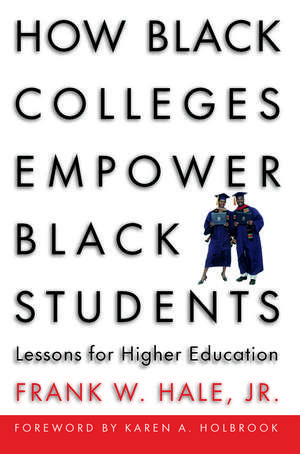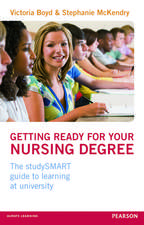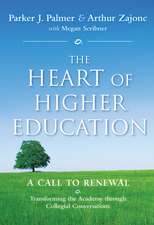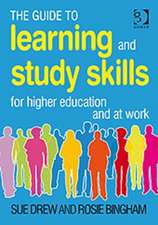How Black Colleges Empower Black Students: Lessons for Higher Education
Editat de Frank W. Haleen Limba Engleză Paperback – 5 iun 2006
Preț: 254.59 lei
Nou
Puncte Express: 382
Preț estimativ în valută:
48.73€ • 52.95$ • 40.96£
48.73€ • 52.95$ • 40.96£
Carte disponibilă
Livrare economică 31 martie-14 aprilie
Preluare comenzi: 021 569.72.76
Specificații
ISBN-13: 9781579221454
ISBN-10: 1579221459
Pagini: 288
Dimensiuni: 152 x 229 x 21 mm
Greutate: 0.53 kg
Ediția:1
Editura: Taylor & Francis
Colecția Routledge
Locul publicării:Oxford, United Kingdom
ISBN-10: 1579221459
Pagini: 288
Dimensiuni: 152 x 229 x 21 mm
Greutate: 0.53 kg
Ediția:1
Editura: Taylor & Francis
Colecția Routledge
Locul publicării:Oxford, United Kingdom
Public țintă
PostgraduateCuprins
Foreword--Karen Holbrook; Foreword--Frank W. Hale, Jr.; Introduction--Frank W. Hale Jr.; 1 Historically Black Colleges and Universities (Hbcus. in The Old South and The New South. Change and Continuity--Samuel Dubois Cook; 2 Black Colleges. Still Making an Indelible Impact With Less--Frank L. Matthews and B. Denise Hawkins; 3 Success Against The Odds. The HBCU Experience--Lawrence A. Davis Jr.; 4 Creating a Pathway. The Role of Historically Black Institutions in Enhancing Access, Retention, and Graduation--Elaine Johnson Copeland; 5 A Tradition Of Access and Academic Excellence. Stanley F. Battle, Pamela G. Arrington, Ronnie L. Collins, Marcella A. Copes, and Frances C. Gordon; 6 A Contribution to Higher Education. Mentoring Methods and Techniques Developed By Historically Black Colleges and Universities--Charles V. Willie; 7 Character Education. The Raison D’être of Historically Black Colleges and Universities--Talbert O. Shaw; 8 Factors That Influence Success for African American Students--Quiester Craig; 9 The Role of Black Colleges in Promoting Self-Concept and Student Centeredness Among Students--James G. Wingate; 10 What Makes African American Students Successful at Historically Black Colleges and Universities. The First-Year Program--Henry Ponder; 11 Future Faculty for The Nation’s Historically Black Colleges and Universities. Challenges and a Model for Intervention--Orlando L. Taylor and Terrolyn P. Carter; 12 Pathways to Success. Recruitment and Retention Methods at Oakwood College--Delbert and Susan Baker; 13 Recreating the Extended Family for African American University Students. A Formula for Success--M. Rick Turner; 14 Personal Reflections of Faculty Members At Virginia State University--James E. Hunter and W. Eric Thomas; 15 Pathways to Student Success at Fayetteville State University--T. J. Bryan; 16 What Makes African American Students Successful in Other Universities. Inclusiveness Rules of Engagement--Anne S. Pruitt-Logan; 17 Old Wine in New Bottles. Visioning Values in Higher Education--Mervyn A. Warren; Epilogue--Frank Hale Jr.
Notă biografică
Frank W. Hale is often referred to as the Dean of Diversity in higher education. He is in constant demand as a lecturer and consultant. His book, What Makes Racial Diversity Work in Higher Education, is widely used in colleges and universities throughout the country. He is Vice Provost and Professor Emeritus at The Ohio State University where he served from 1971-1988, and 1999-2005. He was previously President of Oakwood College in Huntsville, Alabama.
Recenzii
"In this book, contributors from How Black Colleges Empower Black Students detail strategies that help them attract, retain and graduate students who often come from low-income households and are not always fully prepared for college work. The book also underscores the relevance and necessity of having colleges that focus on this vulnerable population of students and produce successful graduates. At the same time, this volume addresses challenges How Black Colleges Empower Black Students must confront to continue to be a force in the education of tomorrow’s students."
Diverse
"How does the Black student experience at HBCUs differ from the experience at traditionally White institutions, and what can be learned? This work should convince any skeptic. Higher education students, faculty, administrators, alumni, and policy makers alike should find interest in and benefit from this book."
Journal of College Student Development
"Simply admitting students into college is no guarantee that they will graduate. Without support, the promise of access rings hollow. In shedding light on the multiple ways in which historically Black colleges and universities have provided that support, this book serves as a guide to all educators of what we must do to provide meaningful opportunity to the students we admit."
Vincent Tinto, Distinguished University Professor and Chair, Higher Education, Syracuse University
"Frank Hale has provided a set of penetrating and analytical essays from a distinguished set of scholars and administrators who understand how the HBCUs have educated successive generations of students who might not otherwise have had access to higher educations. This book should be read by individuals from all racial, religious, and economic groups. It offers a thorough presentation of the way that HBCUs have achieved impressive results with limited resources, and illustrates why these institutions are as important today as when they were founded."
William B. Harvey, Vice President for Diversity and Equity, University of Virginia, Charlottesville
"These leaders of Black colleges and universities eloquently and passionately relate the history of their institutions and their overcoming many barriers. More especially, they share their continuing relevance today."
Reginald Wilson, Senior Scholar Emeritus, American Council on Education
"America has reputable and respected colleges - such as Notre Dame, Yeshiva, and Brigham Young - which enroll students from kindred backgrounds and educate them amid a shared culture. No one has ever suggested that these schools should abandon their missions and blend in the national mainstream. This book also shows how over a hundred historic institutions provide education and encouragement for a critical mass of young Americans. It is an illuminating and important book, deserving the widest possible audience."
Andrew Hacker, Author of "Two Nations: Black and White, Separate, Hostile, and Unequal"
Diverse
"How does the Black student experience at HBCUs differ from the experience at traditionally White institutions, and what can be learned? This work should convince any skeptic. Higher education students, faculty, administrators, alumni, and policy makers alike should find interest in and benefit from this book."
Journal of College Student Development
"Simply admitting students into college is no guarantee that they will graduate. Without support, the promise of access rings hollow. In shedding light on the multiple ways in which historically Black colleges and universities have provided that support, this book serves as a guide to all educators of what we must do to provide meaningful opportunity to the students we admit."
Vincent Tinto, Distinguished University Professor and Chair, Higher Education, Syracuse University
"Frank Hale has provided a set of penetrating and analytical essays from a distinguished set of scholars and administrators who understand how the HBCUs have educated successive generations of students who might not otherwise have had access to higher educations. This book should be read by individuals from all racial, religious, and economic groups. It offers a thorough presentation of the way that HBCUs have achieved impressive results with limited resources, and illustrates why these institutions are as important today as when they were founded."
William B. Harvey, Vice President for Diversity and Equity, University of Virginia, Charlottesville
"These leaders of Black colleges and universities eloquently and passionately relate the history of their institutions and their overcoming many barriers. More especially, they share their continuing relevance today."
Reginald Wilson, Senior Scholar Emeritus, American Council on Education
"America has reputable and respected colleges - such as Notre Dame, Yeshiva, and Brigham Young - which enroll students from kindred backgrounds and educate them amid a shared culture. No one has ever suggested that these schools should abandon their missions and blend in the national mainstream. This book also shows how over a hundred historic institutions provide education and encouragement for a critical mass of young Americans. It is an illuminating and important book, deserving the widest possible audience."
Andrew Hacker, Author of "Two Nations: Black and White, Separate, Hostile, and Unequal"
Descriere
This book offers valuable lessons for faculty, faculty developers, student affairs personnel and administrators in the wider higher education community–lessons that are all the more urgent as they face a growing racially diverse student population.











